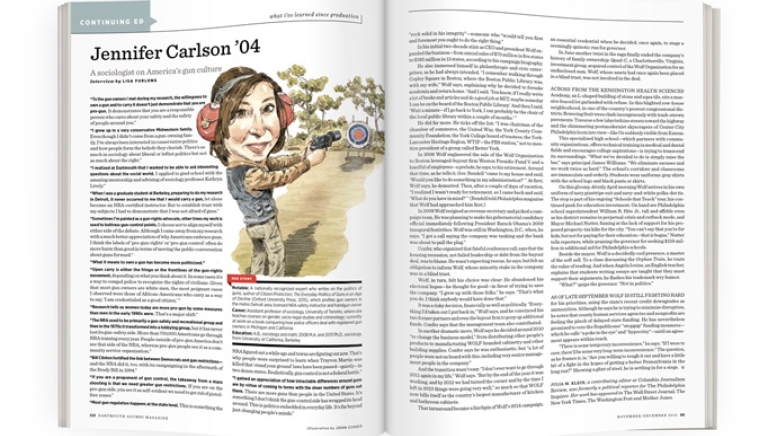Notable: A nationally recognized expert who writes on the politics of guns; author of Citizen Protectors: The Everyday Politics of Guns in an Age of Decline (Oxford University Press, 2015), which profiles gun owners in the metro Detroit area; licensed NRA safety instructor and handgun owner
Career: Assistant professor of sociology, University of Toronto, where she teaches courses on gender, socio-legal studies and criminology; currently at work on a book comparing how police officers deal with registered gun owners in Michigan and California
Education: A.B., sociology and math; 2008 M.A. and 2013 Ph.D., sociology, from University of California, Berkeley
“To the gun owners I met during my research, the willingness to own a gun and to carry it doesn’t just demonstrate that you are pro-gun. It demonstrates that you are a responsible person who cares about your safety and the safety of people around you.”
“I grew up in a very conservative Midwestern family. Even though I didn’t come from a gun-owning family, I’ve always been interested in conservative politics and how people form the beliefs they cherish. There’s so much in sociology about liberal or leftist politics but not as much about the right.”
“I realized at Dartmouth that I wanted to be able to ask interesting questions about the social world. I applied to grad school with the amazing mentorship and advising of sociology professor Kathryn Lively.”
“When I was a graduate student at Berkeley, preparing to do my research in Detroit, it never occurred to me that I would carry a gun, let alone become an NRA-certified instructor. But to establish trust with my subjects I had to demonstrate that I was not afraid of guns.”
“Sometimes I’m painted as a gun-rights advocate, other times my work is used to buttress gun-control points. I choose not to align myself with either side of the debate. Although I came away from my research with a much better appreciation of why Americans embrace guns, I think the labels of ‘pro-gun-rights’ or ‘pro-gun control’ often do more harm than good in terms of moving the public conversation about guns forward.”
“What it means to own a gun has become more politicized.”
“Open carry is either the fringe or the frontlines of the gun-rights movement, depending on what you think about it. In some cases it’s a way to compel police to recognize the rights of civilians. Given that most gun owners are white men, the most poignant cases I observed were those of African-Americans who carry as a way to say, ‘I am credentialed as a good citizen.’ ”
“Research tells us women today are more pro-gun by some measures than men in the early 1990s were. That’s a major shift.”
“The NRA used to be primarily a gun-safety and recreational group and then in the 1970s it transformed into a lobbying group, but it has never lost its gun-safety side. More than 750,000 Americans go through NRA training every year. People outside of pro-gun America don’t see that side of the NRA, whereas pro-gun people see it as a community service organization.”
“Bill Clinton fortified the link between Democrats and gun restrictions—and the NRA did it, too, with its campaigning in the aftermath of the Brady Bill in 1994.”
“If you are a proponent of gun control, the takeaway from a mass shooting is that we need greater gun restrictions. If you are on the pro-gun side, you see it as self-evident we need to get rid of pistol-free zones.”
“Most gun regulation happens at the state level. This is something the NRA figured out a while ago and towns are figuring out now. That’s why people were surprised to learn when Trayvon Martin was killed that ‘stand your ground’ laws have been passed—quietly—in two dozen states. Realistically, gun control is not a federal battle.”
“I gained an appreciation of how intractable differences around guns are by virtue of coming to terms with the sheer numbers of guns out there. There are more guns than people in the United States. It’s something I don’t think the gun-control side has wrapped its head around. This is politics embedded in everyday life. It’s far beyond just changing people’s minds.”




